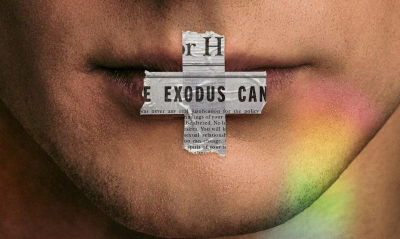Netflix's 'Pray Away': A movie review

“If one more person who was never involved in Exodus speaks for what Exodus did and believed, I may just lose it. The 'Pray Away' film has got everyone sharing their uninformed opinion,” wrote Brenna, former Exodus director.
Exodus International, the widely known ex-gay Christian organization, has recently been taken to task by the 2021 Netflix film "Pray Away." Directed by Kristine Stolakis, the film features the testimonies of a few former Exodus International leaders who use emotional appeal to claim the goal of leaving homosexual behavior or practice caused trauma for those who later embraced gay relationships and identity.
It is not surprising so many reviews of the Pray Away lambaste the organization that used to be Exodus International. After all, since it was shut down in 2013, Exodus has become a convenient tool to use as a scapegoat. But if it is allowed to continue, it will end up being a useful tool to demonize those who hold to biblical sexuality.
What’s perhaps most distressing is that those doing the denigrating have absolutely no connection with the organization about which they write, nor the people featured in the documentary. Becket Cook, for example, who reviewed "Pray Away"for The Gospel Coalition, had no concept of what Exodus was or wasn’t. “Exodus International was missing the forest through the trees, setting people up for failure,” Cook wrote. It would have been helpful if he knew of what he wrote.
I, on the other hand, have a long history with Exodus starting in 1988. I personally received help from a local Exodus ministry in northern California and then gave back help and hope to others seeking to walk faithfully with Jesus and leave behind old identities and behaviors. I helped in women’s ministry at my local church in the San Francisco Bay Area, led women’s ministry in Portland, Ore., served on the board of a local ministry, taught routinely at the Exodus annual conference, and served on the Exodus board of directors for several years. The film also includes my ex-husband, who re-claimed his gay identity and relationships that ended our 21-year marriage.
While the Boy Erased movie was pure fiction, Pray Away is an emotive weapon that has some semblance of reality. Semblance is not the whole picture, nor even an accurate picture, taken from those who have renounced Jesus’ call, “If anyone wishes to come after Me, he must deny himself, and take up his cross daily and follow Me” (Luke 9:23).
In the earliest days of Exodus, Frank Worthen — a co-founder of Exodus — said that if the organization no longer pursued holiness, it would no longer exist. In the end, the final leaders had compromised personally and theologically, capitulating to cultural ideals about sexuality rather than to the Author of the Gospel.
The movie has roused sympathy for the five souls who thought they could leave LGBT, conceive of an identity outside of their sexual feelings, and live apart from homosexual identity and behavior, only to abandon that pursuit in various ways. The movie has not — of course — roused sympathy for those who have left LGBT and remain faithful to Christ and biblical teaching contained in Scripture. It also did not give an accurate picture of what Exodus was, what it promised (or rather, what it did not promise) and mis-characterized Exodus as a pseudo-psychological organization. It conflated psychology with Christian discipleship.
The sympathetic characters in the documentary were actually the ones who added confusion during their leadership roles in Exodus’ later years. Alan Chambers and Randy Thomas popularized the message, “Change is possible!” with ad campaigns that did not spell out exactly what change meant. John Paulk denied the truth that he continued to have same-sex attraction while representing Exodus in media. Yvette Schneider is likely the one who brought Exodus into political action because of her past in policy. I find it ironic that the charges of dishonesty and toxic counsel are leveled by them against the rest of us who continue to follow Jesus out of our LGBT pasts. Amazing!
So, let’s correct the record: Exodus International did not promise a removal of homosexual feelings; instead, it offered help to walk faithfully with Jesus away from homosexuality. Exodus also offered support for those who did not see their sexual feelings as a moral imperative to embrace. That perspective, filmmaker Stolakis stated clearly in Newsweek, “creates self-hatred in the deepest and darkest of ways while self-harm is such a part of this movement.”
Stolakis did not affirm her uncle’s choice to not live according to his sexual feelings, yet it is a person’s right to live according to their highest values — whether it be gay feelings or biblical beliefs. Some people go back into gay relationships, some continue to deal with residual same-sex attraction of one degree or another, some no longer deal with same-sex attraction on a regular basis, if at all.
Why not accept that all of these are potentials and that there is honor before God in not embracing sexual immorality? Why should others be allowed to judge those of us who have abandoned our pasts for the One who loves us more? Where is the tolerance of those of us who walk out of the LGBT lifestyle because of the incredible love of Jesus, and have faithfully lived this experience with joy?
Scapegoating what Exodus truly was, not the cartoon it is made out to be in "Pray Away," will only serve to offer a tool to those who wish to despise the Gospel and those who hold to scriptural beliefs.
Anne Paulk is a board member and the executive director of Restored Hope Network, a coalition of member ministries, counselors and pastors in the USA dedicated to, “restoring hope to those broken by sexual and relational sin, especially those impacted by homosexuality. We proclaim that Jesus Christ has life-changing power for all who submit to Christ as Lord; we also seek to equip His church to impart that transformation.”



























